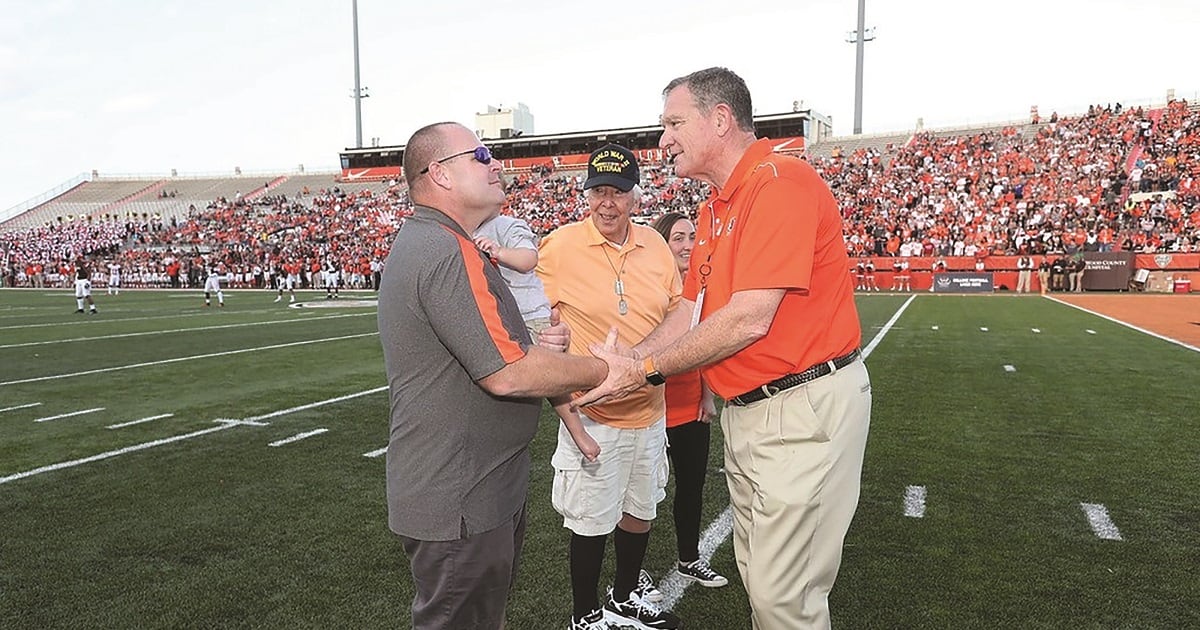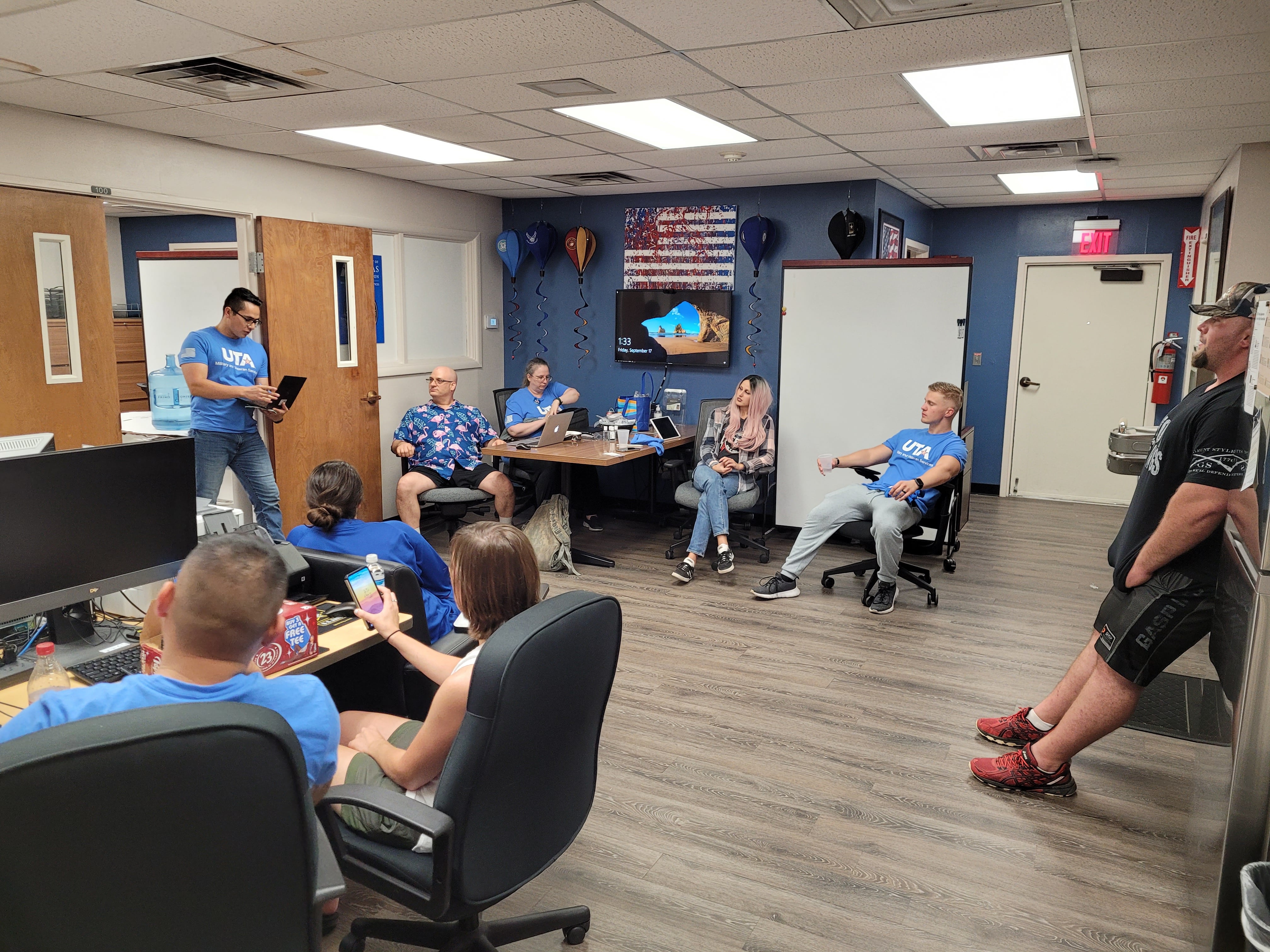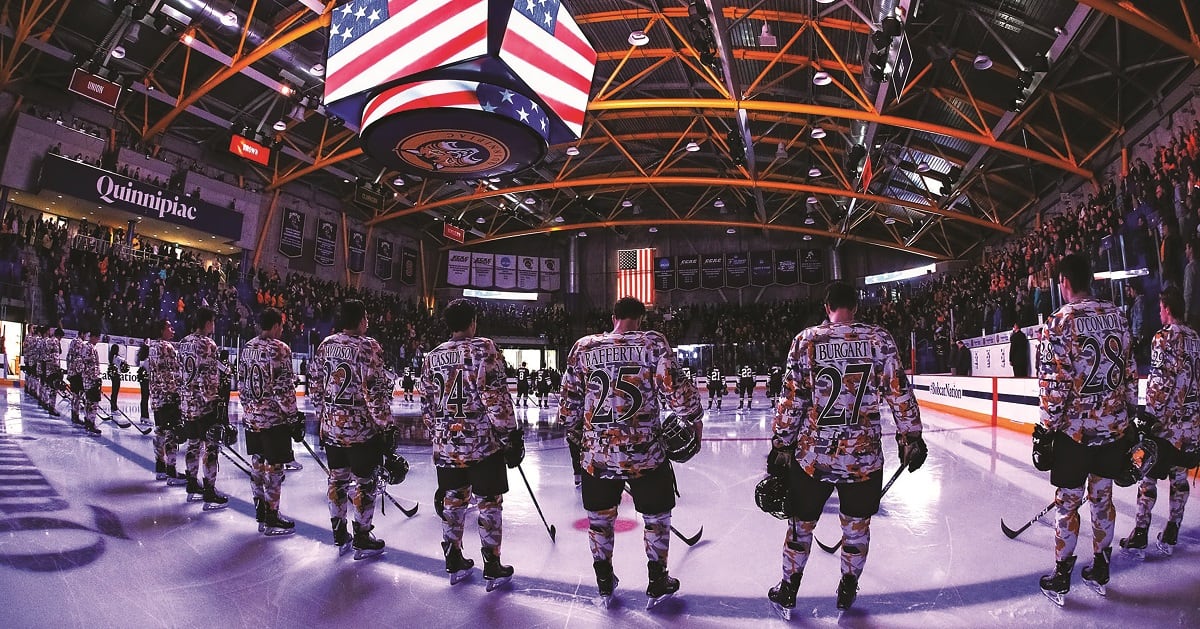As a new student at Bowling Green State University, Jason Kaylor, an Army veteran, had trouble finding somewhere to do his homework.
He could not study at home, because he has several children. He tried out the library, but he felt that he did not fit in there. So, he started doing his homework in his car in a university parking lot.
And then he found the campus veterans center, complete with a quiet study room.
“That’s pretty much what it started out as — a little place where I felt welcomed and kind of fit in, and where people understood me, to do my studies at,” said Kaylor, 42, who is now a senior at the public university in Bowling Green, Ohio. “But the more and more time that passed with me coming in and out of the office, it really became kind of my home away home, or my second family, if you will, because of the amazing support that I received here both academically and personally.”
Having a physical space to gather can make a big difference for student veterans, as Kaylor’s experience illustrates.
The University of South Carolina had no designated place for veterans to gather until January 2021, when it opened its veteran and military student center. Now, student veterans can take advantage of conference rooms, study rooms, a lounge, a canteen and a closet full of professional attire for men and women.
More than just a set of resources, the center is a place “to be around people that understand your experiences,” said student veteran Jodi Symington.
Students who served often come to the center to ask administrators questions about their benefits or academic issues, said Jared Evans, the executive director for veterans and military affairs at the public university in Columbia, South Carolina.
“And then they run into someone here in the center that actually can help them or point them in the right direction for support, whatever it is — it could be child care, it could be job-related, housing-related, it could be anything,” Evans said. “It has created an environment where there’s a lot of organic conversation and interaction.”
These brick-and-mortar spaces designated for veterans are just one reason that USC and Bowling Green took the top two spots in Military Times’ 2022 ranking of the best colleges for veterans.

Returning to campus, and community
The ranking follows a year of transition in higher education. Many schools have shifted back toward in-person education, after more than a year of online-only or hybrid education amid the COVID-19 pandemic.
In many programs, student veterans have had to transition toward a college experience that takes place in classrooms, not Zoom rooms.
With in-person education comes commutes, which have made time management more difficult for some student veterans who live far from campus and have jobs on top of their coursework, according to Symington, who is the head of the University of South Carolina’s Student Veterans of America chapter.
Still, the return to in-person education has proven appealing to many veterans, said Jason Burke, executive director of veterans and military affairs at the third-ranked Quinnipiac University, a private university in Hamden, Connecticut. After an enrollment dip among veterans in the 2020-21 and 2021-22 academic years, the incoming veteran class is back to pre-COVID levels.
“I do know from the current students that we have that they couldn’t wait to get back into the classroom,” Burke said.
Student veterans are older than most traditional students and often have families. These students may face hurdles finding community outside of the classroom, even now that many programs are back in person, said Abby Kinch, vice president of programs and services for Student Veterans of America, a national network of student organizations that advocates for veterans in higher education. Veteran applicants should therefore look for colleges that emphasize social support for student veterans.
“Yes, we go to school for programs,” she said. “But additionally, what’s so important specifically for veterans is finding a school that encourages engagement with the university or encourages veteran inclusion.”
How the rankings were compiled
Campus groups geared toward veterans can bring students together outside of the classroom. The SVA chapter at the 4th-ranked University of Texas at Arlington, for instance, entered a team into this fall’s university-wide Oozeball tournament — a mud volleyball competition — in which the student veterans placed well.
Samantha Wann, a senior at UTA, said that the SVA has given her a sense of camaraderie she had not experienced since the Navy. At the community colleges she attended before UTA, she had felt isolated.
“That really changed for me when I came to UTA, because I got to be a part of that organization, and now I’m an officer of that organization,” she said. “I have way more social interaction with all of my friends, and I go out more. It’s just a healthier environment for me. I feel like I have a bigger support system that enables me to go to school while also dealing with, you know, my kids at home and being married, and all that kind of stuff.”

Career support for student vets
The schools that dominate the list support veterans as they transition from the military to college life, offering veteran-specific orientations, coaching professors in working with student veterans and providing veteran-specific mentoring.
But the top-ranked schools also help veterans navigate a second transition: from college to full-time careers.
“I have not met a student vet on our campus yet that their primary goal is not to get through their education as quickly as possible, maximize their benefits, and find that job that’s going to help support their families and that’s going to get them to where they want to be in their own professional lives,” said James Kumm, executive director for military and veterans services at UT Arlington.
UTA hosts lunches with veterans in the area who work at Fortune 500 companies, allowing students to learn from and network with those professionals. It also offers veterans mock job interviews and resume reviews — resources that many of the schools that top the Best for Vets list also offer.
Barbara Henry, assistant vice president for nontraditional and military student services at Bowling Green State University, said her office reviews resumes with an eye toward translating military jargon into language that makes sense to civilian employers. She began making these reviews a priority after helping a student with his impressive but highly technical resume a few years ago.
“I am quite sure if he had been talking to someone with military experience, they would have known what he did, but I had to ask him, line after line, ‘OK, so now tell me about what you did here,’” she said. “When I got done, and realized the depth and breadth of his experience, I knew that we really needed to institute ways to help our students make that translation.”
USC partners with employers who provide job opportunities for veterans, and some of these employers also help the school’s veterans with their job application process.
“It makes it so much easier and less scary going back out into the real world,” Symington said.

Changing use of benefits
College administrators from the top-ranked schools pointed to changes in the ways that veterans take advantage of their benefits.
For one, more families of veterans are using educational benefits. That’s, in part, because since the Forever GI Bill passed in 2017, veterans have had no time limit on their use of GI Bill educational benefits, and some transfer these benefits to their children or spouses.
Kumm, the UT Arlington administrator, also noted that thanks to the strong economy, some veterans may have decided to enter the workforce directly, leaving their education benefits available to their families.
Other veterans have found new strategies to squeeze the most out of their GI Bill benefits, which generally cover four years of education. More veterans are paying out of pocket for two years of less expensive community college and then using their GI Bill benefits for the final two years of college and two years of graduate school, Kinch said. Her own PhD dissertation examined veterans in higher education.
“We’re being a lot more strategic about how we’re using education benefits,” Kinch said. “So, you’re going to see a lot more master’s degrees.”
Soldiers have faced a particular challenge in paying for college: navigating the troubled tuition-assistance platform ArmyIgnitED, which had its bumpy launch in March 2021. Some college administrators told Military Times that IgnitED had technical problems that made it hard to operate.
“Even up on my desktop screen, I still have one of our soldiers’ multiple submissions that got denied,” Burke, the Quinnipiac administrator, said in mid-August. “And the feedback [from ArmyIgnitED] was awful. It takes three or four weeks for somebody from ArmyIgnitED to get back to you. Granted, the volume was probably massive, because all these schools were like, ‘We can’t seem to decipher how you want these files.’ "
The Army had scheduled to transition the platform to a new provider, one that already works with the Air Force, at the end of August. But the change came too late for some service members, who became so frustrated by the platform that they did not enroll last year, according to several of the colleges surveyed.
Given how tricky navigating benefits can be, the schools that topped the Military Times list had employees dedicated to helping veterans through that process.
Wann had high praise for Kumm, who manages services for vets and military students at UT Arlington.
“He shows us the support that we need, and if anybody has any kind of issue, he really goes out of his way to try and help them any chance he gets,” she said. “He’s a real big security net for us veterans there at the school.”
— Hilary Niles compiled survey results and graphics, and contributed to this story.
Irene Loewenson is a staff reporter for Marine Corps Times. She joined Military Times as an editorial fellow in August 2022. She is a graduate of Williams College, where she was the editor-in-chief of the student newspaper.





